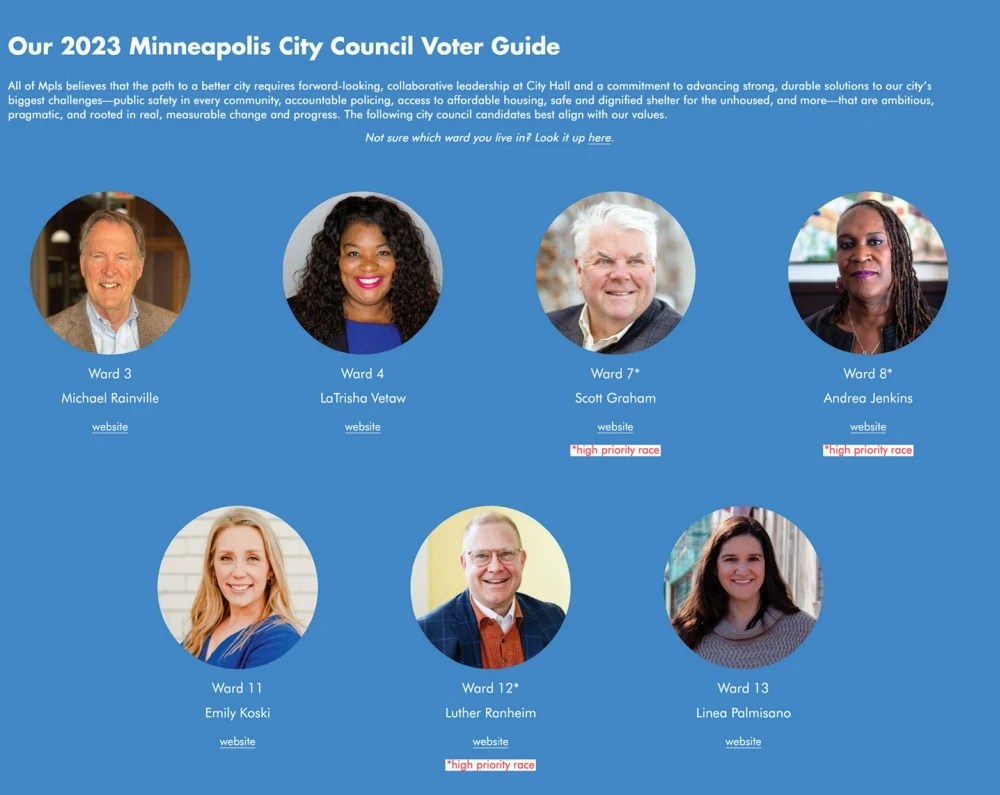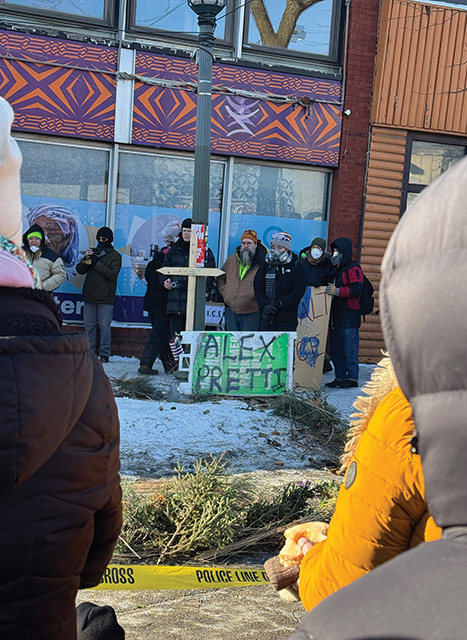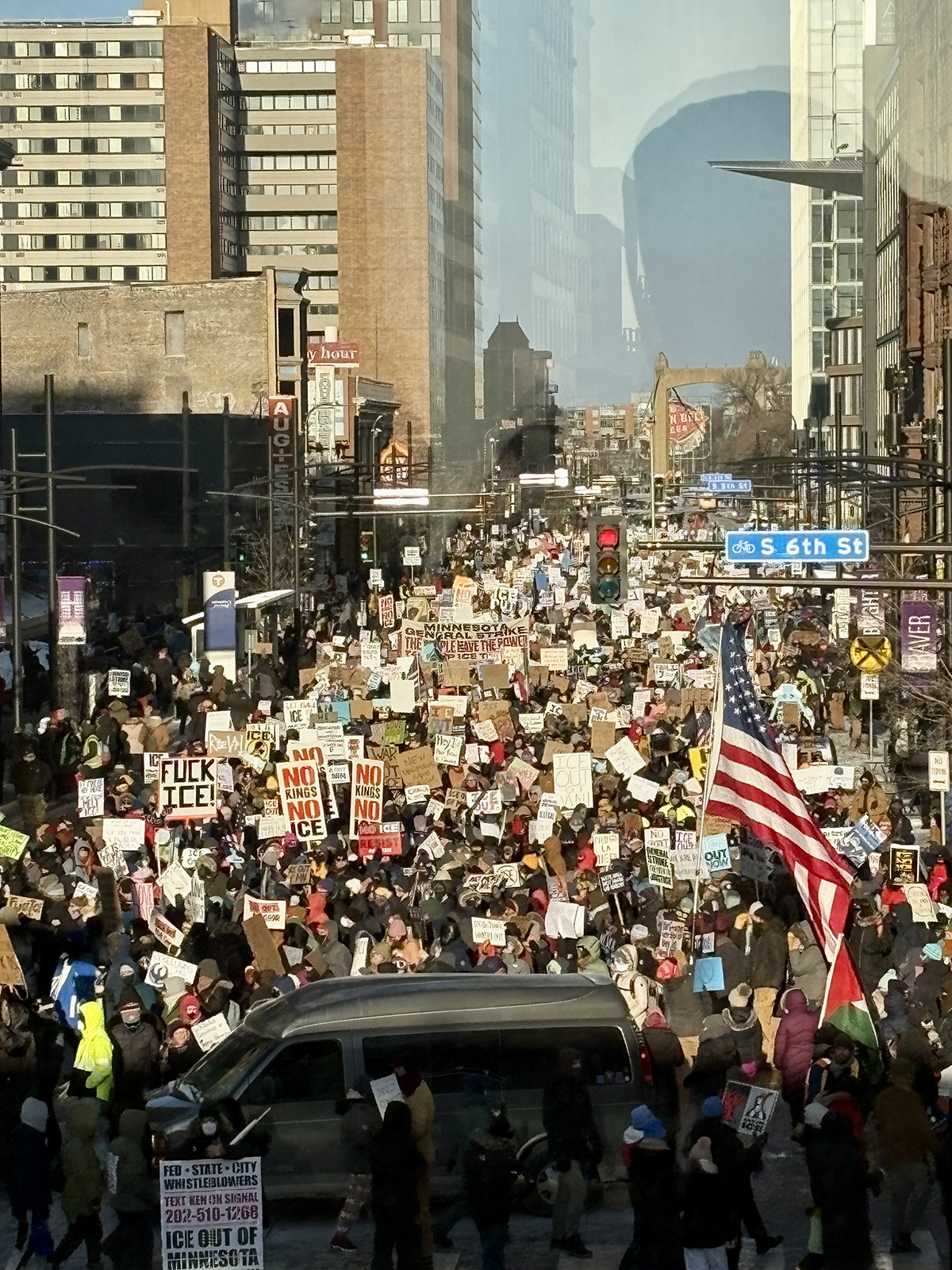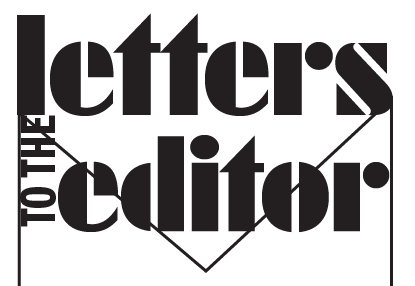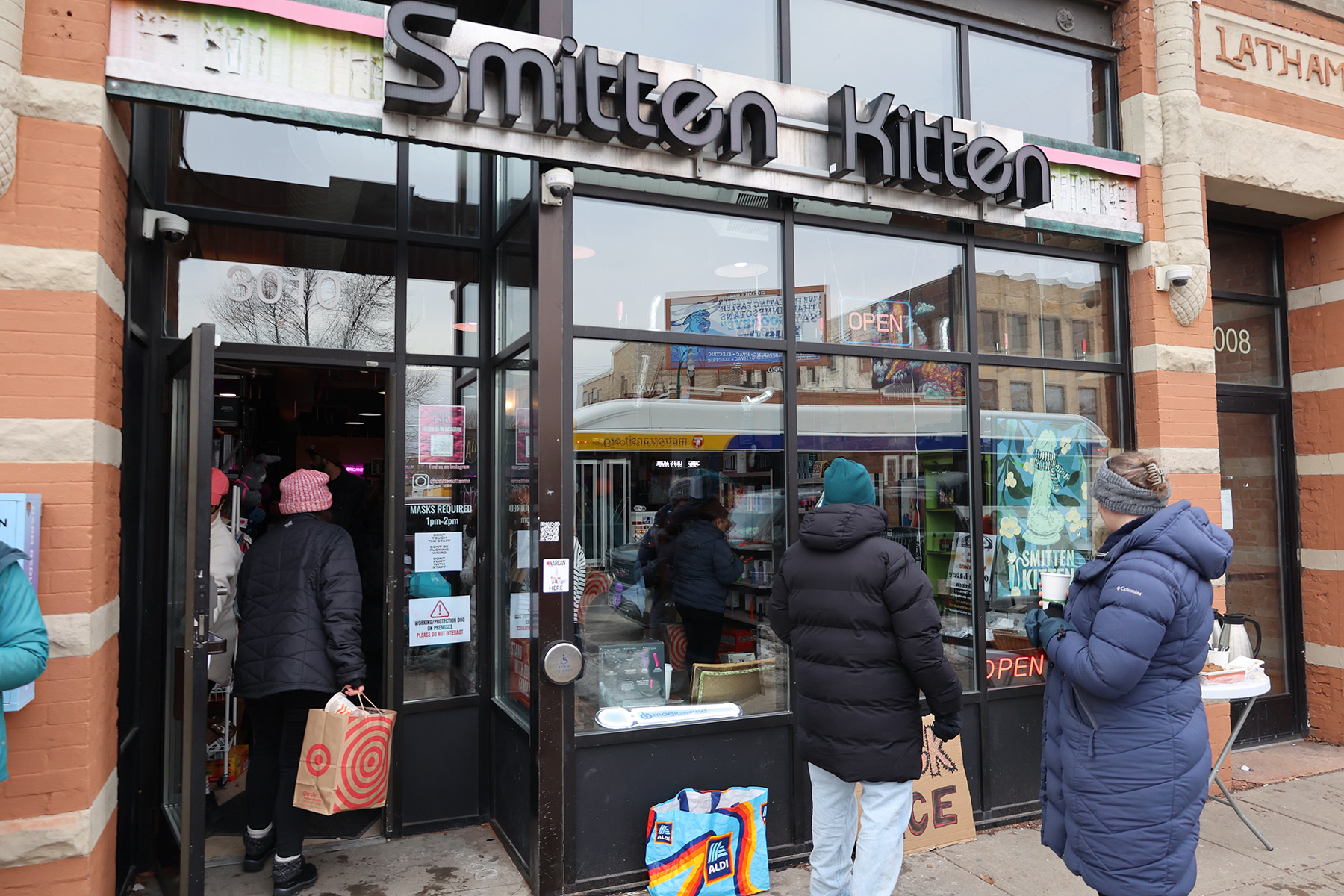The last Republican mayor in Minneapolis was Charlie Stenvig, whose term ended in 1978. The last Republican Council Member was Dennis Schulstad. His term ended in 1998. Since then, Minneapolis city leadership has been dominated by Democrats, known in Minnesota as the DFL, which is short for the Democratic-Farmer-Labor Party. Today, the city is deeply divided by two groups within the DFL, promoting very different visions for the future of Minneapolis.
Over the past several months, this ideological war for the control of the city council has been fought via our mailboxes and social media feeds with two sides fueled by political action committees, known as PACs.
By the time this article goes to print, the election will be over. I’m hoping to help to clarify things looking back as we assess the results of the election over the ensuing weeks ahead.
Confused by the left’s infighting and mudslinging in the battle for the soul of the DFL?
One group is the center left, often called “moderates,” although there is much debate over labels. Pew Research, in its 2021 political typology, calls these individuals “Democratic Mainstays” and “Establishment Liberals,” occupying the center-left of the political spectrum. This group includes people like Hillary Clinton, Joe Biden, Dean Phillips and Tim Walz.
Pew Research calls the other group the “Progressive Left.” They occupy the farthest left of the political spectrum. In Minneapolis this group is often called “progressives,” although again there is debate over labels. They include people like Bernie Sanders and Ilhan Omar, the Democratic Socialists of America (DSA) and other groups aligned with the progressive movement.
The DSA states their agenda is as follows: “Capitalism is a system designed by the owning class to exploit the rest of us for their own profit. We must replace it with democratic socialism, a system where ordinary people have a real voice in our workplaces, neighborhoods, and society… We want to collectively own the key economic drivers that dominate our lives, such as energy production and transportation… We want to win ‘radical’ reforms like single-payer Medicare for All, defunding the police/refunding com munities, the Green New Deal, and more as a transition to a freer, more just life.”
When the Democratic Socialists were unsuccessful nationally with the 2016 Sanders presidential campaign, they refocused their efforts locally.
In 2017, Our Revolution Twin Cities was formed by Sanders supporters and became a catalyst to organize far-left groups into a local movement. In 2017 they endorsed 14 candidates for Minneapolis City Council and nine were elected, delivering Lisa Bender the council presidency. As a result, in 2018, the council had nine progressives and four moderates.
In the 2020 election, power shift- ed. The council now has five moderates, five progressives and three swing votes who mostly vote with the moderates.
By 2021, Amendment 2, the amendment to remove minimum staffing levels for the Police Department, also known as the “defund” amendment, deepened the divisions in the city. Defunding the police is part of the platform of the Democrat- ic Socialists and most progressives supported the amendment. Most moderates opposed the amendment, wanting both police and reforms. The amendment failed with 56% of voters opposing it, showing that moderates held a slim majority in the city.
In 2023, these deep divisions are shaping the upcoming city council election. On the progressive left, the Twin Cities Democratic Socialists (affiliated with the national DSA organization) endorsed five candidates. The progressive PAC, “Minneapolis for the Many,” endorsed five candidates, including three also endorsed by the Democratic Socialists. It is expected that candidates endorsed by both groups will tend to vote as a progressive bloc on most issues if elected.
There is no national equivalent to the Democratic Socialists making endorsements in this election. The local PAC “All of Mpls” supported the moderates and endorsed seven candidates. If elected, it is expected they will tend to vote as a moderate bloc.
Five progressives and four moderates received the endorsement of the Minneapolis DFL. However, irregularities in the endorsement process, brought up most recently by Mike Norton, the former vice chair of the Minneapolis DFL, make it even more unclear what the Minneapolis DFL endorsement represents.
Some of the major differences be- tween the progressive and moder- ate agendas are described as fol- lows:
Police: Progressives seek to invest in a new community safety division, which may come at the cost of additional police officers, while moderates want to hire more police while implementing police reform. There is actually broad agreement on many other public safety issues like hiring mental health responders and outreach teams for the homeless.
Encampments: Progressives want encampments to remain until residents can be safely moved to shelters or permanent housing; they are against sweeps and closures citing that people are retraumatized and just pushed around the city in an endless cycle of encampment building and tear down. Moderates see en campments as inhumane and want encampments to be removed citing that they are causing crime, violence and death to people living in and around the encampments. They tend to support the clearing of encampments with people being relocated to emergency shelters.
Transportation and Parking: Pushed by progressives, Minneapolis adopted a goal of reducing local automobile travel by 60% in the next seven years. Progressives want to achieve this through substantially changing roadways to promote walk- ing, biking and transit by sacrificing parking stalls and drive lanes. Moderates want a transportation system focused on balancing access to jobs, schools and small business with eq- uity, addressing climate change, reducing carbon emissions and improving human health. They acknowledge that automobiles are a common mode of transportation that needs to be supported as we transition to electric vehicles, citing that the are unlikely to go away. They also advocate for transit, bicycling and walking but are skeptical of eliminating parking spaces and drive lanes with fear of impacts to businesses and traffic congestion.
Rent Control: Progressives want to protect lower- and middle-income families with a cap on rent increases, with many advocating for a hard 3% cap similar to St. Paul. Moderates oppose this, arguing that rent control ultimately drives up the cost of housing and limits new development, ultimately hurting lower- and middleincome families.
Municipal Sidewalk Shoveling:
Progressives want the city to shovel sidewalks to improve safety for pedestrians as part of its walk-biketransit agenda. Moderates see automating something currently largely done manually as bad for the environment and its $40 million price tag as too expensive and impractical to implement.
Economy: Progressives tend to focus more on workers and worker rights, like establishing a minimum wage for Lyft and Uber drivers, emphasizing the need to protect workers. While also supporting some regulation, moderates focus on supporting small business owners by giving them autonomy to make decisions about how to run their businesses, emphasizing job growth and wealthbuilding from letting the market drive decisions.
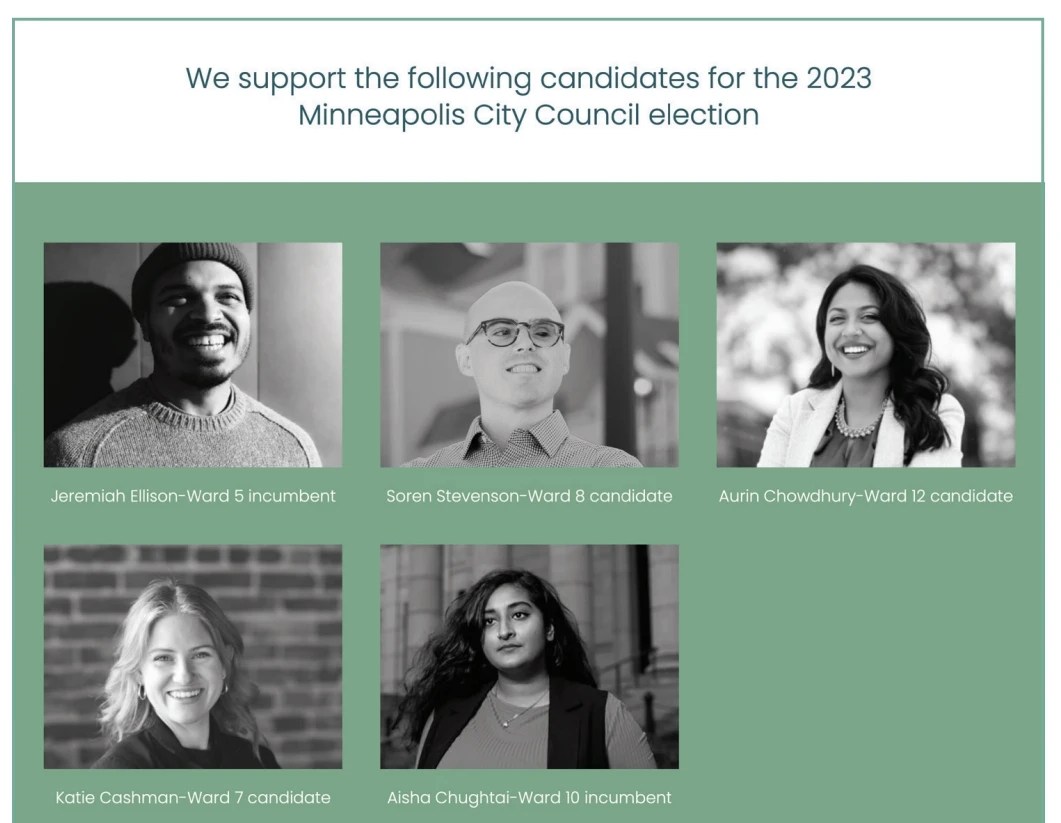
How do Ward 7 candidates feel about their PAC endorsements?
Scott Graham’s campaign provid- ed this statement on his endorse- ment by All of Mpls: "Since we began this campaign in January, we have been focused on connecting with Ward 7 voters and prioritizing solutions that meet the needs of our city and our ward. While we have no control over independent expenditures that support or oppose our campaign, I’m proud to be running in alignment with candidates across Minneapolis that believe in collaboration and pragmatic policymaking as a means to effective city government, many of whom are also supported by All of Mpls."
Katie Cashman responded with this statement on her endorsement by Minneapolis for the Many: “I have repeatedly condemned Independent Expenditure spending in our local elections. Independent Expenditures such as All of Mpls and Minneapolis for the Many do not contact or coordinate with the candidates that they “endorse.” It is actually illegal for a candidate to coordinate with an Independent Expenditure — they choose you without any conversation, which is not how organizational and personal endorsements work. For example, I have been endorsed by Unite Here Local 17 — our local union representing hospitality staff that work primarily in Downtown hotels. I met with leaders of the union and hospitality workers to better understand their needs. I received their endorsement after long conversations discussing problems such as workplace safety and compensation. Minneapolis for the Many calling me an ‘endorsed candidate’ is a misnomer, as I have not had any coordination with them and did not go through an endorsement process.
It’s also wrong for these Independent Expenditures to imply that a slate of candidates has identical political positions. For me, I am not supporting rent control, nor a reduction in our police budget, so the association with other candidates who do support those positions is frustrating.
I am seeking to build constructive relationships between council members so that we do not have a bifurcated city council. We need to be creating fluid factions on the council and to have more independent council members who are free thinkers and who truly represent their constituents’ wishes on various issues. For this reason, if elected, my team and I will work to change campaign finance law to build transparency around Independent Expenditure spending, and to create public financing methods for our local elections, to keep big money and dark money groups out from influencing local elections, which should be funded by and decided by local residents.”
What's at stake?
Which side can lay claim to the Democratic Party and which agenda the city will embrace in the next two years will be determined in the election on Nov. 7, the day after we go to press.
Unfortunately, it is expected there will be a low turnout, given that only municipal elections are on the ballot. This means that only a small number of people will likely decide which vision the city pursues for the next two years.
